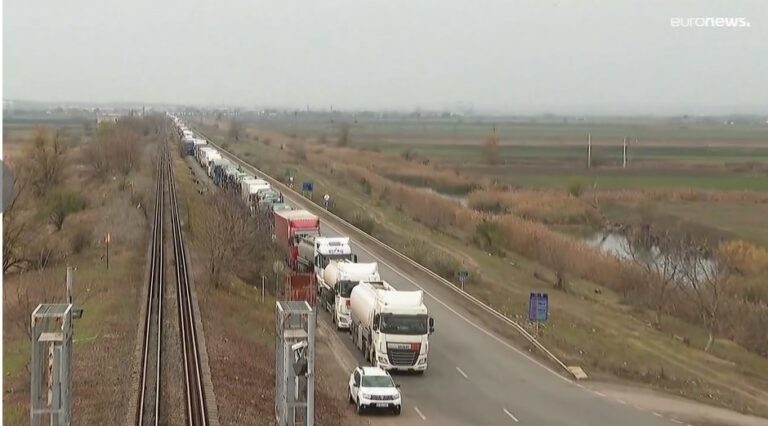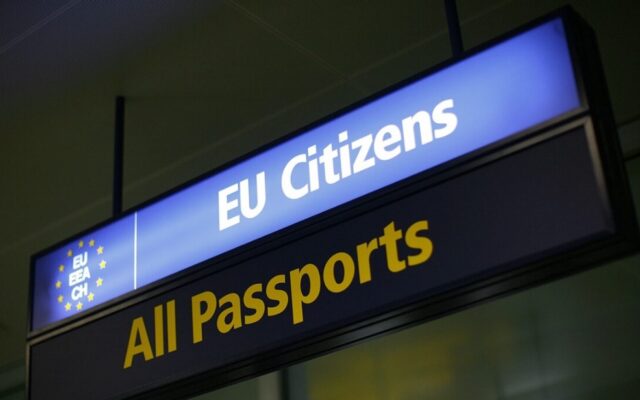
EXCLUSIVE: The ordeal of a Romanian driver at the Bulgarian border, facing dozens of kilometers of queues / The costs and time delays for Schengen freight transporters / A single parking lot generates 400 thousand euros in revenue
A Romanian truck driver laments that the Bulgarian authorities are not making sufficient efforts to alleviate the traffic congestion at the border with Romania and reveals how they profit from carriers. Meanwhile, the towns near the Romanian-Bulgarian border are beset by dirt and pollution.
Urmărește cele mai noi producții video G4Media
- articolul continuă mai jos -
„There’s a perpetual 30-kilometer line of trucks. The Bulgarian side isn’t actively working to ease the traffic flow. In Ruse, for instance, you have to park for 27 hours, spend another 5 hours just to get in, and then an additional 6 hours to exit the parking lot. This all sums up to about 40 hours,” the driver explains.
As per the Border Police’s website, on Thursday morning, truck drivers faced a 360-minute wait at Giurgiu, 200 minutes at Calafat, and 90 minutes at Negru Voda when leaving the country. Entering Romania, the expected waiting times were 250 minutes at Calafat, 40 minutes at Giurgiu, and 360 minutes at Negru Voda.
However, drivers contest these official figures. „The queue stretches 30 kilometers. That’s at least 30 hours of waiting. This is especially true for Euro 6 vehicles, which must take a break after 15 hours in line due to their schedules,” a driver comments.
In Bulgaria, there’s a 5 km queue in Biala, near Ruse, and then another 6 km to enter the parking area. „Once you’re in the parking lot, you find yourself behind 500 cars, all waiting for their turn,” the driver adds.
These queues persist regardless of the season, but recently, there’s been an increase in traffic due to power outages on the Romanian side caused by a blizzard.
The driver remarks that border operations have become lucrative, potentially generating around 400 thousand euros for a private operator.
„CNAIR should manage to process one car per minute at each weighbridge. Averaging less than 5 minutes per car is unrealistic when considered over the entire day. For example, during shift changes at 7 am, no vehicle passes from 6:30 to 7:30 am. Additionally, each car must wait for the green light and then proceed at a maximum speed of 5 km/h. At the toll booth, checking for the vignette (mandatory after 2 days in the queue) and bridge toll payment, particularly by card, takes at least a minute. And in Ruse, there’s a whole ordeal with parking: Romanians pay 25 euros, Bulgarians only 7. Romanians stay for 30 hours, Bulgarians just a few,” he explains.
The driver also notes that in Ruse, there’s a parking lot requiring registration for bureaucratic procedures, all costing money.
„They claim parking isn’t mandatory, you just need to register and wait. But two cars registering simultaneously (one entering the lot and one with a parking permit) don’t leave for Romania at the same time. The one in the lot leaves after 24-30 hours… the one with the voucher, who refused to pay 25 euros, takes a minimum of 40 hours because that’s how they want it. There’s no way to check your turn. You’re at their mercy. It’s a huge business, this parking. According to the Border Police, about 800-900 trucks pass daily. At least 600 enter the parking lot, with Bulgarians being a small number. Of 600, let’s say 500 trucks, excluding Bulgarians who pay only 7 euros, pay 25 euros. That’s 12,500 euros from 500 cars, plus 700 euros from a hundred cars paying 7 euros. That’s a daily minimum of 13,200 euros, or 396,000 euros per month from one parking space,” the driver details.
The kilometers-long queues at the Romanian-Bulgarian border, prevalent throughout the year, concern Bulgarians near the busiest customs points. The Bulgarian daily DunavMost sees a resolution in both countries joining the Schengen area.
„Romania and Bulgaria have been EU members since 2007. Their Schengen area entry applications, which would enable free movement of goods and services between member states without border controls, remain unapproved. If they were to join Schengen, border delays, congestion, and emissions from idling engines would significantly decrease.
For tourists, the queues are a nuisance. But for heavy truck drivers crossing the EU border daily, the economic and health impacts are more substantial,” reports the Bulgarian daily.
Residents of Ruse have long been protesting against air pollution, hoping to bring the issue to the European Parliament’s attention.
„A few weeks ago, we waited over 24 hours at the Bulgarian-Romanian border,” a Romanian driver told the newspaper. „Pollution is inevitable. I drive a refrigerated truck which must run continuously, otherwise the cargo spoils,” he added.
According to Eurostat, southeastern Europe harbors some of the EU’s
dirtiest cities. Bulgaria and Romania have the highest and third-highest levels of PM2.5 fine particles in the Union, respectively. The situation worsens in winter, with studies indicating that PM10 particle levels increase in Bulgaria as temperatures drop, mainly due to transport, industry, and domestic heating.
The European Environment Agency states that fine particles are particularly harmful, reducing life expectancy and causing chronic and acute respiratory and cardiovascular diseases.
„Air pollution is a major cause of lung cancer,” medical oncologist Roxana Makari says.
Bulgarian media report that the exclusion of Bulgaria and Romania from Schengen results in 46,000 tonnes of CO2 emissions annually. In other words, nearly half a million tonnes have been emitted in the last decade.
This is equivalent to 600 GWh of coal-fired electricity, enough to heat 60,000 households.

Donează lunar pentru susținerea proiectului G4Media
Donează suma dorită pentru susținerea proiectului G4Media
CONT LEI: RO89RZBR0000060019874867
Deschis la Raiffeisen Bank



